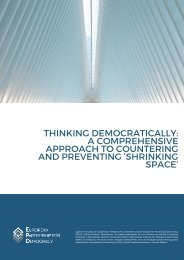Repression and resilience: Diagnosing closing space mid-pandemic
Create successful ePaper yourself
Turn your PDF publications into a flip-book with our unique Google optimized e-Paper software.
44 REPRESSION AND RESILIENCE: DIAGNOSING CLOSING SPACE MID-PANDEMIC<br />
of their accounts. As a result, local NGOs have had to reroute significant efforts toward alleviating the effects of the<br />
COVID-19 p<strong>and</strong>emic, particularly the lack of access to safe water, limited hygiene, food insecurity <strong>and</strong> malnutrition.<br />
Simultaneously, a deepening split between civil society <strong>and</strong> opposition parties has propelled the emergence of<br />
alternative civil society coordination groups, which aim to reclaim their independence from all political affiliations.<br />
The level political playing field had been undermined in the last five years through a series of actions such as barring<br />
<strong>and</strong> co-opting opposition parties, harassing breakaway groups, <strong>and</strong> the instrumentalisation of official media outlets.<br />
An additional blow was delivered in June 2020, when a Supreme Court intervention ruled the current electoral law<br />
void. The newly appointed National Electoral Council created a new paralegal framework with no constitutional or<br />
demographic basis for the elections of the 2021-2026 Legislature. The new system raised the total number of deputies;<br />
redistributed the proportion of seats in favour of lesser populated states; modified the seat apportionment system;<br />
eliminated direct uninominal c<strong>and</strong>idacies; <strong>and</strong> dismantled the system of Indigenous peoples’ representation. The new<br />
norms will only continue to skew the critically impacted political field in favour of the government.<br />
Burundi<br />
As COVID-19 began spreading across Burundi, the ruling party minimised the crisis <strong>and</strong> avoided implementing<br />
containment measures that would have compromised their re-election campaign. The few p<strong>and</strong>emic measures<br />
taken were instead used to evade electoral scrutiny: African Union observers were told upon arrival that they had to<br />
quarantine until after ballots closed, whilst voters registered abroad were unable to enter the country. Only once a new<br />
President was elected did the government acknowledge the p<strong>and</strong>emic <strong>and</strong> carry out large-scale testing as a way to<br />
gain legitimacy, even though doubts persist on the reliability of official COVID data.<br />
Civic <strong>space</strong> has been under threat for a while, with a gradual decline taking place years before the p<strong>and</strong>emic, <strong>and</strong><br />
intensifying since 2015 following protests against President Nkurunziza’s third m<strong>and</strong>ate. The ruling elite has harmed the<br />
legitimacy of a dynamic civil society by creating government-organised non-governmental organisations (GONGOs),<br />
whose leaders are often picked for high-level political appointments. Together with government-owned media<br />
platforms, GONGOs legitimise government positions vis-à-vis the opposition <strong>and</strong> give a fake semblance of pluralism<br />
<strong>and</strong> inclusiveness. Alongside that, authorities have launched campaigns framing civil society as a security threat.<br />
Several activists have thus been exiled or have had to move their mobilisation online, although with limited impact.<br />
A number of legal measures have been put in place that subject civil society to authorities’ control, regulate public<br />
meetings, <strong>and</strong> curtail media freedom through m<strong>and</strong>atory registrations. A major chilling effect has also derived from<br />
administrative attacks, such as the seizure of NGO assets <strong>and</strong> the suspension of some organisations for not respecting<br />
ethnic personnel quotas or for allegedly conspiring in an insurrection. Regarding extrajudicial measures, there has<br />
been an increase in state violence targeting civil society, activists, journalists, <strong>and</strong> opposition <strong>and</strong> religious figures. All<br />
these forms of civil <strong>space</strong> repression are sensitive to the electoral cycle <strong>and</strong> have worsened around election time.<br />
The pre-p<strong>and</strong>emic <strong>space</strong> for electoral competition was already inaccessible due to efforts to hinder any opposition<br />
- for instance setting high financial barriers for running in elections <strong>and</strong> requiring government permission to hold<br />
party meetings. To further skew the level playing field, the ruling party has engaged in a “Nyakurisation” process, in<br />
which authorities legally approve only party wings whose leaders are subservient to the ruling party <strong>and</strong> that can<br />
therefore act as their satellites. On top of this, the government has abused state institutions like the National Police <strong>and</strong>

















